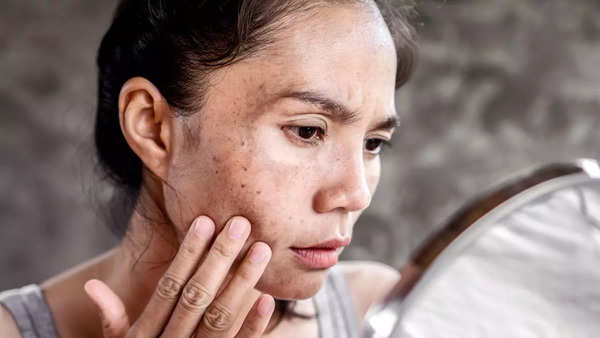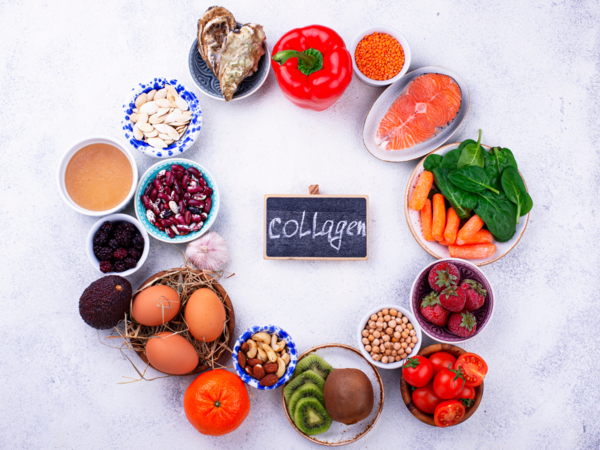Nutrition: the foundation of skin health
Nutrition is a key component of your skin care routine, as important nutrients like antioxidants, protein, omega-3 fatty acidsand healthy fats are essential to maintain skin vitality. This element helps increase skin elasticity, reduce inflammation, and stimulate collagen production, which makes skin look young and healthy.

Antioxidants, such as vitamins C and E, beta-carotene, and selenium, fight oxidative stress caused by free radicals, which can cause premature aging and dullness. Meanwhile, omega-3 fatty acids—commonly found in fish, walnuts, and flaxseeds—strengthen the skin’s barrier and maintain hydration levels, ensuring a plump, hydrated appearance.
key micronutrients for the skin health
Adding important micronutrients to your diet can significantly improve skin health:
Vitamin C: Known due to its ability to promote collagen production, vitamin C not only maintains the elasticity of the skin but also protects it from UV damage when it illuminates the skin.

Vitamin E: This powerful antioxidant neutralizes harmful free radicals and helps retain moisture, making it ideal for those with dry or sensitive skin.
Zinc: Especially beneficial for acne sufferers, zinc helps regulate oil production, reduce inflammation, and promote clearer, healthier skin.
Biotin (Vitamin B7): Biotin is essential for maintaining healthy skin, hair, and nails. It helps in the production of fatty acids that nourish the skin.
Omega-3 Fatty Acids: Omega-3s are important for reducing inflammation, preventing skin dryness, and supporting overall hydration.
Collagen: While not a micronutrient, collagen supplements are known for their role in improving skin elasticity, reducing wrinkles, and increasing hydration.
Beyond nutrition: Lifestyle factors matter
While nutrition plays a major role, other lifestyle habits such as staying hydrated, getting adequate sleep, and managing stress also affect the condition of the skin. Proper hydration can make the difference between plump, glowing skin and dull, dehydrated skin. Consuming enough water every day is important for detoxifying the body and maintaining the skin’s moisture balance.
Sleep is also critical because the skin undergoes repair during rest. Lack of sleep can cause puffiness, dark circles, and uneven skin tone. In addition, stress can worsen skin conditions such as acne and eczemamaking stress management techniques like mindfulness and relaxation practices essential to maintaining healthy skin.

Mental health and happiness: the inner glow
An often overlooked factor in achieving glowing skin is mental health and emotional well-being. Your skin often tells you how you feel inside. Chronic stress, negative emotions, and anxiety can manifest as dull skin, fatigue, or cause conditions like acne and eczema. On the flip side, being happy and relaxed can have tangible benefits. A sincere smile and a positive mindset can improve your appearance, making your skin look more vibrant and youthful. After all, glowing skin isn’t just about topical treatments; it’s about how you feel inside, and true happiness reflects on the outside.
Supplements: How to Choose Wisely
Supplements can complement a healthy diet, but they are not a one-size-fits-all solution. Supplements can provide additional support, but are not a substitute for a nutrient-rich diet. With so many options available, it’s important to choose wisely. Here are three main factors to consider:
Type: Consultation with a healthcare professional before starting any supplement regimen is important, especially when dealing with skin health. Although not a drug, supplements can have side effects. Understanding nutritional deficiencies and personal skin care needs will help you choose the right supplements.
Forms: Supplements come in many forms, including tablets, capsules, gums, soft gels, and powders. If swallowing pills is difficult, try choosing an easier alternative like chewing gum or powder. Be mindful of portion sizes, as some multivitamins require multiple doses to meet your daily nutritional needs.
Quality: Not all supplements are created equal, so it’s important to prioritize high-quality options. In India, where the supplement market is growing rapidly, it is important to choose products from reputable brands that follow strict quality standards. Look for supplements that have been tested by an independent organization or carry certification such as FSSAI approval. This ensures that the product meets the required safety, purity, and potency standards. In addition, it is wiser to choose an established brand that discloses the source of ingredients and the manufacturing process, giving consumers transparency and confidence in the products they use.

Collagen is an important protein that keeps skin firm and elastic, giving you youthful, radiant skin. Collagen production decreases with aging, causing dull and wrinkled skin. A diet rich in collagen can improve our health and skin. This 7-day diet plan is meant to enhance our skin’s natural glow.
A balanced approach
Creating bright, healthy skin requires more than topical treatments. A balanced approach that incorporates proper nutrition, hydration, rest, and stress management is essential. While supplements can provide additional support, they should not replace a nutrient-rich diet or a consistent skin care regimen. Choosing the right supplement involves considering your unique needs, supplement form, and quality.
By caring for your skin from the inside out and adopting a healthy lifestyle, you will not only see long-lasting improvements, but also ensure that your skin naturally radiates health and beauty.
Written by Manik Pande, dietitian, VLCC India




